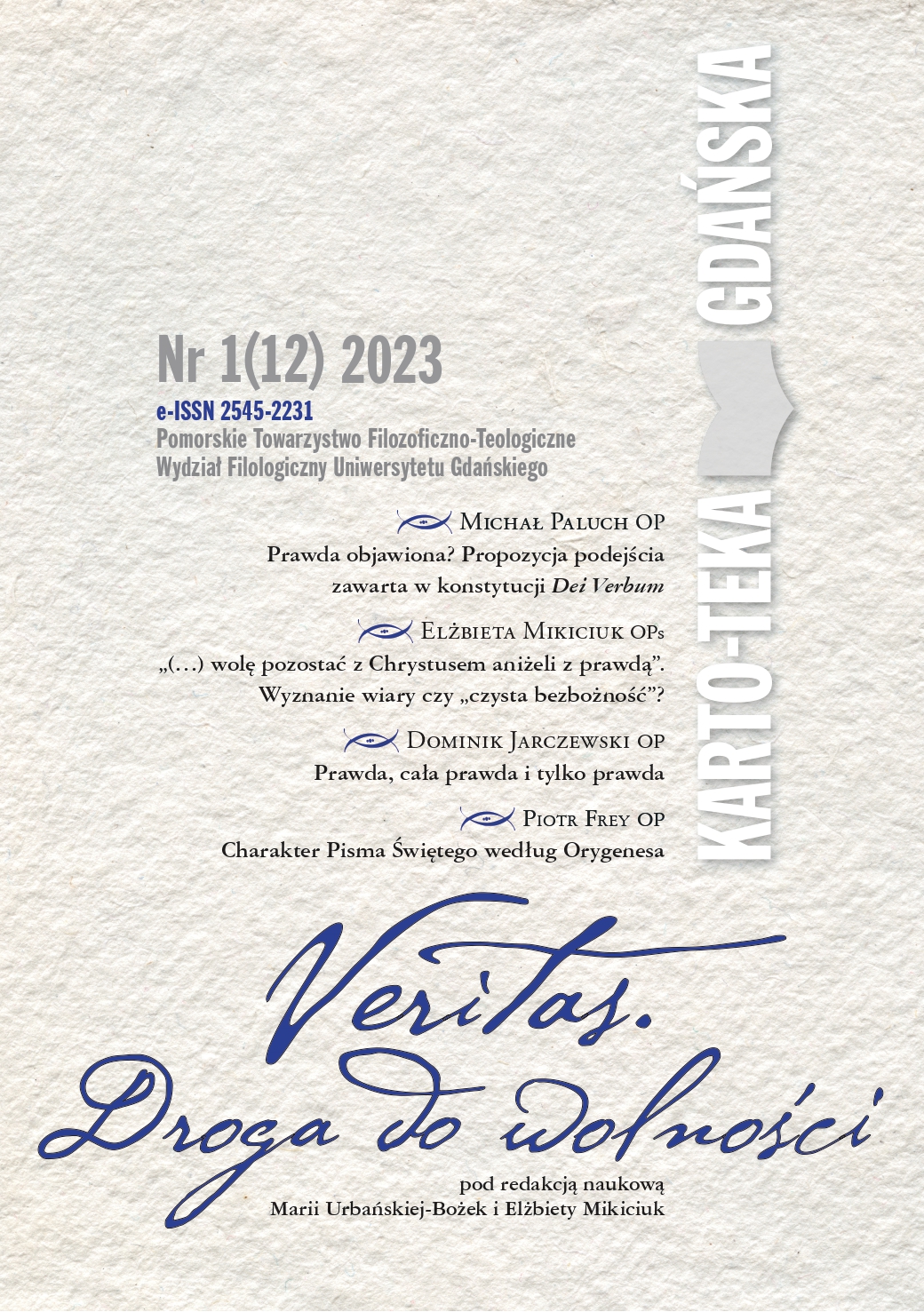Revealed Truth? A Proposal of the Dei Verbum Constitution
DOI:
https://doi.org/10.26881/kg.2023.1.01Keywords:
Revelation, Truth, Second Vatican Council, Dei VerbumAbstract
This paper is an attempt to briefly describe how Christians of the last few centuries - immersed in a discussion with the philosophical culture of their time - tried to point out the proper place for revealed truth in interpreting reality. In response to the growing secularism of the modern era, philosophical projects were born (Kant, Hegel, Kierkegaard) that, taking up the demands of their time, attempted to „run forward”, to establish a place for revealed truth in a new way that would help it elude critics. These philosophical attempts later inspired theologians (including Schleiermacher, Cullmann, Barth), who tried to translate philosophical ideas into concrete interpretations of revelation. In turn, all these discussions carried out mainly, though not exclusively, on the Protestant side, led on the Catholic side to the modernist crisis, which will eventually - thanks to the work of theologians from the circle of la nouvelle théologie (Congar, de Lubac) – be surpassed in the Second Vatican Council's constitution Dei Verbum. The paper presents the various elements of the development thus outlined, leading to finding the right perspective to appreciate the groundbreaking significance of Vatican II's Dei Verbum constitution.
Downloads
References
Arnold C., Mała historia modernizmu, tłum. T. Zatorski, Seria: Biblioteka Historii Kościoła Kraków 2009.
Baron A., Pietras H., SJ (red.), Dokumenty Soborów Powszechnych. Tom IV, Wydawnictwo WAM, Kraków 2005.
Barth K., Church Dogmatics, Vol. I/1, T & T Clark, Edinburgh 1975.
Congar Y., Wiara i teologia, tłum. B. Przybylski, w : Tajemnica Boga, Seria: Studia Instituti Thomistici, t. 2, Księgarnia św. Wojciecha, Poznań – Warszawa – Lublin 1967, s. 1 – 213.
Congar Y., Tradycja i tradycje. Tom 1 : Esej historyczny, tłum. A. Ziernicki, Seria: Dominikańska Biblioteka Teologii, t. 7, W drodze–Instytut Tomistyczny, Poznań – Warszawa 2018.
Congar Y., Tradycja i tradycje. Tom 2 : Esej teologiczny, tłum. A. Ziernicki, eria: Dominikańska Biblioteka Teologii, t. 12, W drodze–Instytut Tomistyczny, Poznań–Warszawa 2022.
Cooper J.W., Panentheism. The Other God of the Philosophers. From Plato to the present, Apollos, Nottingham 2007.
Dorrien G., Kantian Reason and Hegelian Spirit. The Idealistic Logic of Modern Theology, Wiley-Blackwell, Maldan–Oxford 2012.
Dulles A., Models of Revelation, Orbis, Maryknoll, NY 1992.
Durand E., Jusqu’où ouvrir le livre ? Brève théologie des Ecritures, Seria : Lire la Bible Les Editions du Cerf, Paris 2021.
Farkasfalvy D., O. Cist., A Theology of the Christian Bible. Revelation – Inspiration – Canon, The Catholic University of America Press, Washington, D.C. 2018.
Farkasfalvy D., O. Cist., Inspiration & Interpretation. A Theological Introduction to Sacred Scripture, The Catholic University of America Press, Washington, D.C. 2010.
Greshake G., Trójjedyny Bóg. Teologia trynitarna, tłum. bp J. Tyrawa, Wydawnictwo TUM Wrocławskiej Księgarni Archidiecezjalne, Wrocław 2009.
Kant I., Religia w obrębie samego rozumu, tłum. A. Bobko, Seria: Biblioteka Filozofii Religii Wydawnictwo Znak, Kraków 1993.
Kierkegaard S., Okruchy filozoficzne. Chwila, tłum. K. Toeplitz, Wydawnictwo Marek Derewiecki, Kęty 2011.
Lubac H. de, SJ, Słowo Boga w historii człowieka. Objawienie Boże, tłum. B. Czarnomska, Cerf–Kairos–M–Znak, Paryż– Kijów–Kraków 1997.
Mettepenningen J., Nouvelle Théologie. New Theology. Inheritor of Modernism, Precursor of Vatican II, T&T Clark, London – New York 2010.
Oeing-Hanhoff L., Hegels Trinitätslehre. Zur Aufgabe ihrer Kritik und Rezeption, „Theologie und Philosophie“ 1977, nr 52, s. 378–407.
Paluch M., OP, Dlaczego Tomasz, Seria: Biblioteka Instytutu Tomistycznego. Teksty i studia, t. 5, Instytut Tomistyczny, Warszawa 2012.
Rahner K., Podstawowy wykład wiary. Wprowadzenie do pojęcia chrześcijaństwa, tłum. T. Mieszkowski, IW Pax, Warszawa 1987.
Ratzinger J., Dogmatic Constitution on Divine Revelation, w : Commentary on the Documents of Vatican II, red. H. Vorgrimler, Herder, New York 1968, s. 159–166.
Schleiermacher F. D. E., Mowy o religii, tłum. J. Prokopiuk, Seria: Biblioteka Filozofii Religii, Wydawnictwo Znak, Kraków 1995.
Schleiermacher F., The Christian Faith, red. H. R. Mackinthosh i J. S. Stewart, T&T Clark, London 1999.
Scruton R., From Descartes to Wittgenstein. A Short History of Modern Philosophy, Harper&Row Publishers, New York– Cambridge–Philadelphia–etc. 1981.
Splett J., Die Trinitätslehre G.W.F. Hegels, K. Alber, Freiburg [1965].
Talar C.J.T., Introduction, w : Defending the Faith. An Anti-modernist Anthology, red. W. H. Marshner, The Catholic University of America Press, Washington, D. C. 2017, s. 1–23.
Wahlberg M., Revelation as Testimony. A Philosophical-Theological Study, Grand Rapids–U.K. William B. Eerdmans Publishing Company, Michigan–Cambridge 2014.

 Academic Scientific Journals
Academic Scientific Journals

